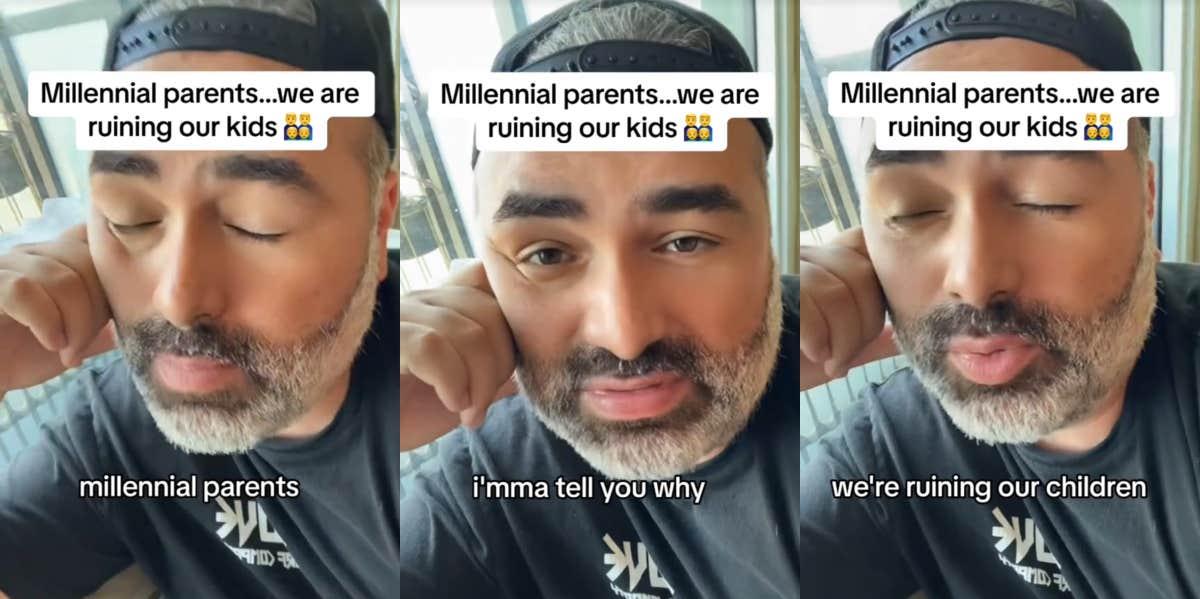Millennial Dad Shares The Specific Way Other Parents His Age Are 'Ruining' Their Kids
We put a lot of blame on Boomer parents, but one Millennial dad explains why his generation might've done worse.
 @dannyboy_sandeigo / TikTok
@dannyboy_sandeigo / TikTok A millennial father named Danny, who has a 20-year-old son (wow, we’re getting old), is having some trouble dealing with being a parent thanks to a parenting decision he believes might have “ruined” his kids growing up.
Taking his theory to TikTok, Danny’s hoping to either warn other millennial parents or see if anyone feels the same way he does — but the answer doesn’t seem to be so cut and dry.
Dad explains why he believes the millennial parenting style is 'ruining' their kids.
“Millennial parents, we’re ruining our children and I’m going to tell you why because my children are now adults and I can see a little bit of the error of the way,” he explains at the start of his TikTok video. He goes on to explain the reason how millennial parents' parenting styles came to be.
“[Boomer] parents never really explained things to us,” Danny explained, claiming that they were just thrown out of the house all day long and were practically forced to fend for themselves. “That kind of ruined us, you know? So we said ‘When we have kids we’re going to explain things to our children and we’re going to get them to — we’re going to get their buy-in,’” he explains.
He wanted his kids to be able to do what they wanted while also explaining the decisions he was making as a parent and teaching them the ways of the world.
“I now see the error of my ways when we’re explaining to our children every single thing in every decision because now they have buy-in,” he explains, “and because they have buy-in, they have a word, and sometimes it [doesn’t] need to be like that.”
Sometimes, Danny just wants his word to be law. We’ve all heard the line, “My house, my rules,” right? He believes that sometimes… it really should just be that simple. Not everything needs to be explained. He realizes that this is contradictory, and admits that it’s “kind of like what our boomer parents said to us,” but he uses his experience as a parent to back it up.
Danny says his 20-year-old son isn’t prepared for the world because of the way he was raised.
Danny’s 20-year-old son moved back home recently, and although Danny claims that he’s happy about the fact that their son would come back home to his family, he’s not happy about how his son is choosing to spend his time.
He claims that his son is just “sitting on the couch all day playing video games, on his phone” and whatnot, while also feeling like “he has a say about getting a job.” Danny wants to say “no, you need to get up and find a job today,” but he believes that explaining everything to him as he was growing up and doing everything for him led his son to a state of unpreparedness.
Although boomer parents weren’t the best at explaining things to their kids, Danny does believe that they were able to instill grit into their children — something that he claims his own son lacks — and he makes a good point.
There is a fine line between establishing your role as a parent and taking charge and justifying your reasoning with your children.
As Ms. Julieta Aguilera, PhDc, and Sarah Chana Radcliffe, M.Ed., C.Psych, has explained, a good rule of thumb is to provide one brief explanation for your kid and that’s it.
“It’s ok to provide explanations for rules, actions, and limits,” Aguilera said in an article. “However, only plan to provide an explanation once prior to giving instructions,” and Radcliffe explains why this is important. “Instead of trying to come up with a reason for your request that meets your six-year-old's standards, you simply let him know that you are in charge. This sets the boundary that this relationship is not a democratic one in which each party gets a vote.”
Danny’s son should be able to reason with himself that it’s important to get a job for the sake of his own future, but Danny believes that it’s his own fault that he never taught him that sometimes, things just are the way they are. By explaining everything, he has almost set his son up for failure because now he thinks he has a say in everything when in reality, he doesn’t.
The approach of taking charge and saying “because I said so” is a little more authoritative, but creating a healthy balance between that and justifying yourself is where parents will find the most success.
Isaac Serna-Diez is an Assistant Editor for YourTango who focuses on entertainment and news, social justice, and politics.
